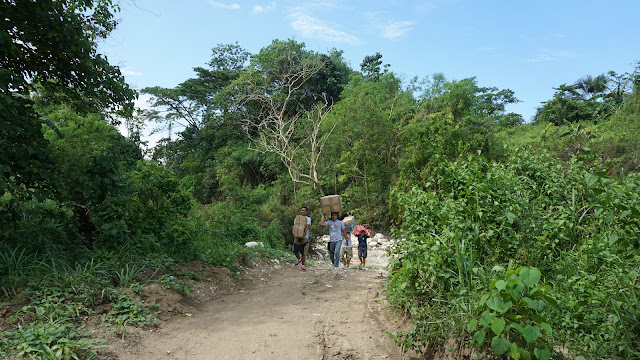In
our outreach group that provides aid for kids in the mountains in the Philippines - called TRails to Empower Kids, or TREK - we make it a point to visit our sites after three or four years to check up on our kids and
see how else we can help.
However, this was not the case for Balangabong Elementary School in Sitio
Balangabong and its annex school in Sitio Ulango, both located in
Barangay Malpalon in Calintaan, Occidental Mindoro. Seeing how much the kids needed help, we
agreed to immediately return. We thought the opportune time would be to coordinate our visit with the celebration of our group’s 10th
Anniversary, where we decided to visit ten of our communities once per month.
#trek10for10
Calintaan is our third outreach, following
#trek10for10 Papaya last March and #trek10for10 Casiguran last April. The
activity happened this May, barely 9 months after our
very first TREK Calintaan, which was August of 2016.
During
our first visit, most of our activities were focused on Sitio Balangabong. We were supposed to visit both Balangabong
and Ulango, but we decided last minute to move the Ulango program to the
jump-off area because of the heavy rains, since the trek to Ulango included
more river crossings.
So,
for our #trek10for10 program, we decided to conduct our handover activities at Ulango.
Both
schools serve Taubuid Mangyan, an indigenous group that used to live in the
upper areas of Calintaan.
However,
I noticed that the community in Ulango is much more conservative and it was
much more difficult to get the kids comfortable with us.
Teacher
Irene de Guzman of Ulango explained that this community is fairly young. It was
only roughly five years ago when the group decided to settle in that community
after a native clergyman convinced them to go down from the mountains.
The
village elders added that they are not used to accepting visitors, especially
since their place is not accessible. From the town proper, it is still about an
hour and a half drive on very rough roads to the jump-off, plus a
twenty minute to one hour trek, depending on the weather or pacing.
 |
| Trail to the community with volunteers hauling the donations |
However,
they conveyed that the group was happy to see people from a totally different
area.
Our
handover was simple. While waiting for the program to start, we asked the kids
to do some artworks, while some of the adults braved our dental mission. During
the formal program, we started with a few welcome remarks, followed by the kids’
dance presentation, then the handover proper.
Kids
lined up to receive their new rubber shoes and bags from Converse; followed by
school supplies donated by another school, JCSGO; then hygiene kits from
SIDCI, whose representatives also joined the program; plus other gifts.
 |
| All the donations, ready for handover |
 |
| Kids eagerly waiting for their turn during the handover |
We then had
to dismiss the kids because of the rains, but we just called
them back when it ceased to handover of their new solar lamps, donated by my
colleague Mr. Cito Beltran (who also donated roofing materials). After that, we had our late lunch.
The
rubber shoes, hygiene kits, and solar lamps are all vital donations. Although
the kids are not used to having footwear (most of them were barefooted during
the trek and handover program), Teacher Irene said the shoes would really be
useful in school activities in the lowlands. “Nahihiya
sila kasi nakayapak sila” (They get shy during these activities because
they don’t have shoes), explains Teacher Irene.
What she used to do is borrow shoes for the kids.
The
hygiene kits of course would help the kids.
Hygiene is health. I noticed
during our visit there that a lot of the kids and mothers have some skin
problems. I even saw a mom covered with what seemed like rashes
breastfeeding her baby. I know it
wouldn't affect the baby, but it was a really sad sight.
The
school supplies, like in the cases of other schools we visit, are helpful not
just to the students, but also to the parents and teachers. The donations ease the worry of parents, and
relieve teachers of these expenses.
The
solar lamp will help the students study at night. Since most of the students help their parents
during daytime, they only have nighttime to study. The older students even attend night classes
to make up for missed daytime lessons.
 |
| Teacher Irene explaining how to use the solar lamp |
It
was a fast handover, with no time for proper group pics because of
the rain, but we have imprinted in our memories the joy in the kids’ and their
parents’ faces.
 |
| TREK volunteers and PTA leaders |
Because
the dental mission was not yet finished after we ate our lunch, which was
already around 3:00 PM, I decided to gather up the kids again. We still had a few toys left and the kids who
gave impromptu song numbers and recited poems got them.
The
kids were much more relaxed that time and we had lots of laughs. I was touched when one of the kids sang so
that she can give a toy to his brother.
I ended up giving toys to them both.
Really,
the kindness I witness in our TREKs are something else. I know I am very fortunate to experience
all of these, and I thank God He chose us to be
one of the channels of His blessings.
There
are still a lot more TREKs this year (seven to be exact!) and I look
forward to more of these meaningful interactions. Updates are available at
www.trailstoempowerkids.com.













0 comments